The Child Poverty Summit 2024: Project Management and Resilience

When coming into working at The Childhood Trust, I wasn’t sure what to expect from this experience. Having never had experience of working in a corporate environment and having little interaction with professionals such as these, I was worried I wouldn’t know what to say or how to act. Being raised in a poverty-stricken area in Leeds, I have always been extremely interested in children’s poverty, how this impacts lives’, and what is done to facilitate these conversations. Thus, my four-month journey at The Childhood Trust, working on an event to create and make these interactions possible, would allow me to build on my knowledge and see the smoke behind the mirrors, what is truly being done and what there is yet to do.
Filled with anxiety and excitement at the same time, on my first day I came suited and booted at 9am with my notebook full of ideas, and rang the doorbell, ready to make some great impressions. No one in the office came until 10am and there was only 4 people, including myself, that was in all day. I sat in the office until 4pm with a slow laptop, going through the files and doing my two tasks of the week, I finished these in a day. This day was a whirlwind and shock to say the least, I came in with high expectations and ready to create this amazing, groundbreaking summit, and was met with a couple of tasks that were done really easily. I thought I would be contributing creative ideas to enhance the summit’s structure and flow, and I did, but I just had to find my voice in order to do this. Having never been in an environment such as this before, my once very opinionated and loud voice became quiet and complacent due to wanting to excel and succeed – I quickly realised after a few days that if I don’t speak my voice, these bright ideas would not be heard and I wouldn’t be exceling in this, rather I would be failing due to not helping it reach its full potential.
During my next few weeks, I adapted to this new environment, contributing creatively and working with key stakeholders to ensure the conception of ideas for the summit were strong to then start building on them. For this, I ensured I researched the current issues within child poverty in London, looking at the most prevalent issues and how this can evolve into a central theme that serves as a foundation for ideas we can delve deeper into in our sessions. I needed to ensure that I was taking into account all everyone’s ideas, whilst contributing my own. This year we explored the theme of Spaces, Places, and Wellbeing, where we looked to explore how the spaces and places of London impact our children and young people. While delving into the physical impact, we also explored the mental implications of the lack of suitable spaces for children.
Within the weeks after that, I returned home to Leeds from mid-August to mid-September, where I worked completely remotely. This changing environment, coupled with the increased expectation, increased my workload and made me adapt to a whole new style of working. Not having a set place where you can do your work and not being able to categorise work and home, made things difficult. I found it increasingly harder to concentrate on work and get tasks done in an efficient and time-bound manner. I imagined in my mind before I returned home that I would have a strict schedule and routine where I would be able to do this 10am – 5pm role with no expectations, laying down strict boundaries with my family. However, I quickly came to realise that with school holidays and with having family and friends around you this was not entirely possible. Finding myself getting tasks done at a slower rate and having less motivation to do tasks generally after a year of university and a summer of work, I realised that I needed to find a way to get back to the image I had imagined for myself initially. Moreover, due to working completely remotely I felt a distance from the actual event and the decision-making process, everyone was in the office making these key decisions and I would have told them later when they had already been made. During one of those last weeks at home, I sat down, virtually, with my supervisor and I communicated my issues, thoughts and feelings. I knew that if I did not do this, then she would not be able to see what had been happening and would not be able to help me, allowing me to be actively involved again. This was a pivotal turning point in my Leadership-In-Action Project, I felt like I had finally regained some of the autonomy that I was craving whilst working virtually and felt that my supervisor had truly understood where I was coming from, which allowed me to work efficiently and with increased effective communication.
The last weeks leading up to the summit were hectic, from speakers not being confirmed to going back to university, I had, to say the least, a busy couple of weeks. From the advisory board being dropped, to a whole panel of speakers not being confirmed and other technical problems, I had to learn to be quick on my feet and adapt quickly to the changes and challenges in event planning. Although the last few weeks were hectic, it was where I learned the most about leadership and bringing an event such as this together. From making the summit presentation and brochure, to ensuring we had enough volunteers for the event and making a brief for them, working out what roles they would have, were new skills learnt.
On the day of the summit, I was transcended back into that first day in the office, filled with the same emotions, only this time more excitement than anxiety. I was exhilarated to see all the attendees getting involved, what the panellists would delve into deeper and just seeing all the ideas come to life. Throughout the day, I was constantly running around and trying to solve any problems that arose, including speakers dropping out 5 minutes before the event and some not even showing, this allowed me build on practical leadership and project management skills. Seeing it come to life, especially with such positive feedback from attendees and volunteers, was a rewarding experience, and hearing young people speak about their experiences and needs reaffirmed the importance of the work done, especially in creating spaces where they feel safe, understood, and valued.
This Leadership-In-Action Project allowed me to build on so many leadership and soft skills, from learning how to switch my writing from academic to profession when writing things such as briefs, to multitasking, time management, and problem-solving, which pushed me in many different ways. I was challenged to think critically, manage details, and coordinate with some incredible people. Furthermore, I had heard of the Tuckman method of group productivity before, but through this Leadership-In-Action Project, this idea had been brought to life. The Forming, Storming, Norming, and Performing aspects, each brought a phase taught me about resilience, flexibility, and the importance of adaptability. From handling last-minute logistical issues to ensuring technical requirements were met, every aspect of the event challenged me to think on my feet and proactively address potential problems before they could disrupt the event.
Reflecting on this experience, I have learnt many things from my supervisors and colleagues about leadership. The professional manner in which they used when things aren’t going right, the sheer dedication and time spent on completing tasks to a high standard, and the capability to ensure all of that is done to high standards even with tight deadlines, are some of the many things I learnt in my time. Through my evaluation at the end of my Leadership-in-Action Project, I was able to see the impact that I made on my supervisors and the whole team at the Childhood Trust. My lived experience, enthusiasm, and fresh perspective allowed the Summit to have a new feel and allowed the team to understand my background and how this relates to the charity’s mission. I feel that through my involvement, I have made a lasting impact on future London Child Poverty Summits, and the team at the Childhood Trust.
Thank you to the whole team at The Childhood Trust for making this a truly valuable experience, pushing me both professionally and personally. I would especially like to thank my supervisors, Posy Barker and Helen Riley, for this invaluable opportunity teaching me some unforgettable lessons.
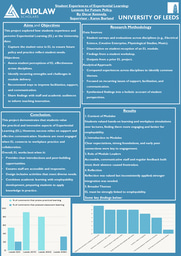
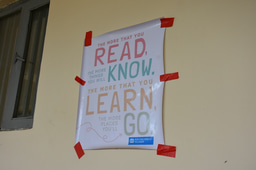
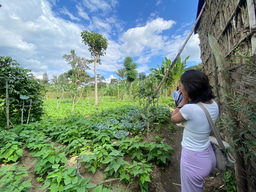
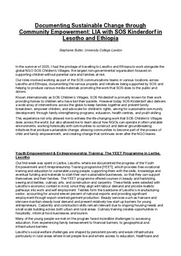
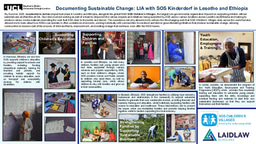
Please sign in
If you are a registered user on Laidlaw Scholars Network, please sign in
This sounds like a really packed journey, Hannah! Your insight about the importance of communicating and getting an outsider perspective when things get hectic is super valuable and can really help you to consolidate the key issues you have in your mind. It sounds like you made a real impact despite the challenges!